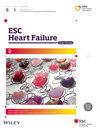Heritability and causality of QRS duration and chronic heart failure risk
Abstract
Aims
Observational studies report conflicting results on the relationship between QRS duration and chronic heart failure (CHF), presenting challenges in establishing a causal link. This study investigates the heritability of QRS duration and CHF and their causal relationship.
Methods and results
Genome-wide association studies (GWAS) cohort for QRS duration included 10 815 samples from the IEU Open GWAS project, while exome-wide association studies (EWAS) data were sourced from the CHARGE Exome-Chip EKG consortium, involving 77 898 European individuals. The CHF GWAS dataset comprised 486 160 samples from the EMBL-EBI GWAS catalogue. Heritability estimates were determined using linkage disequilibrium score regression (LDSC). Mendelian randomization (MR) and sensitivity analyses assessed the causality. Heritability estimates for QRS duration were 16.3% from GWAS and 18.5% from EWAS. CHF exhibited minimal genetic influence with a heritability estimate of 0.8%. Six variants from the GWAS and 27 variants from the EWAS, including those in ion channel-related genes, like CASQ2, SCN5A and SCN10A, were identified as instrumental variables. MR analysis indicated that shorter QRS duration is causally associated with an increased CHF risk [QRS GWAS: (IVW (MRE): OR 0.84, 95% CI 0.78–0.91, P = 2.26E-05); QRS EWAS: (IVW (MRE): OR 0.98, 95% CI 0.96–0.99, P = 6.57E-05)]. Sensitivity analyses confirmed the robustness of these findings [corrected GWAS: Egger_intercept = 0.002, P = 0.94; corrected EWAS: Egger_intercept = 0.007, P = 0.38].
Conclusions
This study establishes a causal relationship between shorter QRS duration and increased CHF risk, highlighting the importance of genetic factors in cardiac electrical conduction. Identifying QRS duration as a genetic marker for CHF risk can enhance early diagnosis and personalized treatment strategies.


 求助内容:
求助内容: 应助结果提醒方式:
应助结果提醒方式:


